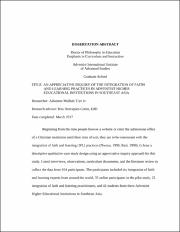An Appreciative inquiry of the integration of faith and learning practices in Adventist higher educational institutions in Southeast Asia
Abstract
Beginning from the time people browse a website or enter the admissions office of a Christian institution until their time of exit, they are to be conversant with the integration of faith and learning (IFL) practices (Nwosu, 1999; Rasi, 1999). I chose a descriptive qualitative case study design using an appreciative inquiry approach for this study. I used interviews, observations, curriculum documents, and the literature review to collect the data from 104 participants. The participants included six integration of faith and learning experts from around the world, 35 online participants in the pilot study, 21 integration of faith and learning practitioners, and 42 students from three Adventist Higher Educational Institutions in Southeast Asia.
Using the appreciative inquiry process was a positive experience for me and for the participants. The results described what the IFL strengths were of the different institutions and what needed to improve while maintaining a positive atmosphere. In order to make integration of faith and learning more practical I developed an Innovation Configuration for IFL. Creating the innovation configuration map for IFL practices in Adventist Higher Educational Institutions in Southeast Asia was a collaborative and iterative process with the experts and practitioners. The innovation configuration map includes 10 components necessary for implementing IFL from an Adventist worldview. The innovation configuration is a description of the practitioners’ action and the focus is on what people actually do (Gaikwad, 1991; Henriquez-Roark, 1995; Hord, Stiegelbauer, Hall, & George, 2013). The reason IFL is important is because it is the interpretation of Adventist educators that goes beyond what public schools practice. Other religious organizations practice IFL, however, Seventh-day Adventists have a distinct set of beliefs and values that are important to identify and teach. It is how Adventist educators add value to what they do in schools. It gives our institutions a reason for existence. It is an area that continues to need additional research.
Seventh-day Adventist educators have not had an operational definition of IFL before that serves as a self-evaluation tool for teachers, and an observational tool for peers. It will be helpful to supervisors because they will have something specific to use to suggest professional development activities and students, teachers, and staff will have more specific vocabulary to enable them to think, discuss, demonstrate, and implement IFL.


